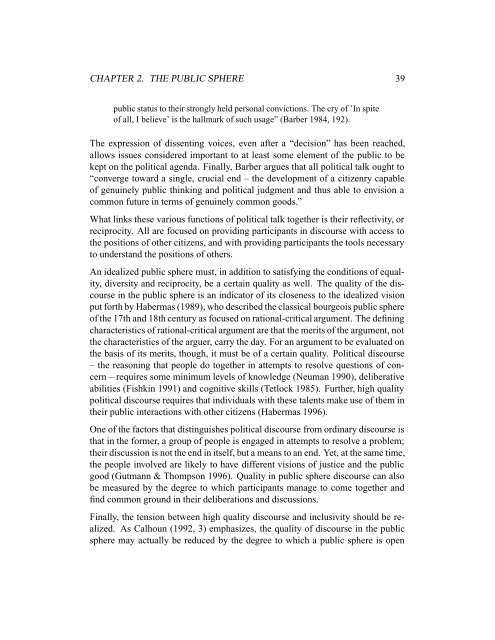Expanding the Public Sphere through Computer ... - ResearchGate
Expanding the Public Sphere through Computer ... - ResearchGate
Expanding the Public Sphere through Computer ... - ResearchGate
Create successful ePaper yourself
Turn your PDF publications into a flip-book with our unique Google optimized e-Paper software.
CHAPTER 2. THE PUBLIC SPHERE 39<br />
public status to <strong>the</strong>ir strongly held personal convictions. The cry of ’In spite<br />
of all, I believe’ is <strong>the</strong> hallmark of such usage” (Barber 1984, 192).<br />
The expression of dissenting voices, even after a “decision” has been reached,<br />
allows issues considered important to at least some element of <strong>the</strong> public to be<br />
kept on <strong>the</strong> political agenda. Finally, Barber argues that all political talk ought to<br />
“converge toward a single, crucial end – <strong>the</strong> development of a citizenry capable<br />
of genuinely public thinking and political judgment and thus able to envision a<br />
common future in terms of genuinely common goods.”<br />
What links <strong>the</strong>se various functions of political talk toge<strong>the</strong>r is <strong>the</strong>ir reflectivity, or<br />
reciprocity. All are focused on providing participants in discourse with access to<br />
<strong>the</strong> positions of o<strong>the</strong>r citizens, and with providing participants <strong>the</strong> tools necessary<br />
to understand <strong>the</strong> positions of o<strong>the</strong>rs.<br />
An idealized public sphere must, in addition to satisfying <strong>the</strong> conditions of equality,<br />
diversity and reciprocity, be a certain quality as well. The quality of <strong>the</strong> discourse<br />
in <strong>the</strong> public sphere is an indicator of its closeness to <strong>the</strong> idealized vision<br />
put forth by Habermas (1989), who described <strong>the</strong> classical bourgeois public sphere<br />
of <strong>the</strong> 17th and 18th century as focused on rational-critical argument. The defining<br />
characteristics of rational-critical argument are that <strong>the</strong> merits of <strong>the</strong> argument, not<br />
<strong>the</strong> characteristics of <strong>the</strong> arguer, carry <strong>the</strong> day. For an argument to be evaluated on<br />
<strong>the</strong> basis of its merits, though, it must be of a certain quality. Political discourse<br />
– <strong>the</strong> reasoning that people do toge<strong>the</strong>r in attempts to resolve questions of concern<br />
– requires some minimum levels of knowledge (Neuman 1990), deliberative<br />
abilities (Fishkin 1991) and cognitive skills (Tetlock 1985). Fur<strong>the</strong>r, high quality<br />
political discourse requires that individuals with <strong>the</strong>se talents make use of <strong>the</strong>m in<br />
<strong>the</strong>ir public interactions with o<strong>the</strong>r citizens (Habermas 1996).<br />
One of <strong>the</strong> factors that distinguishes political discourse from ordinary discourse is<br />
that in <strong>the</strong> former, a group of people is engaged in attempts to resolve a problem;<br />
<strong>the</strong>ir discussion is not <strong>the</strong> end in itself, but a means to an end. Yet, at <strong>the</strong> same time,<br />
<strong>the</strong> people involved are likely to have different visions of justice and <strong>the</strong> public<br />
good (Gutmann & Thompson 1996). Quality in public sphere discourse can also<br />
be measured by <strong>the</strong> degree to which participants manage to come toge<strong>the</strong>r and<br />
find common ground in <strong>the</strong>ir deliberations and discussions.<br />
Finally, <strong>the</strong> tension between high quality discourse and inclusivity should be realized.<br />
As Calhoun (1992, 3) emphasizes, <strong>the</strong> quality of discourse in <strong>the</strong> public<br />
sphere may actually be reduced by <strong>the</strong> degree to which a public sphere is open
















